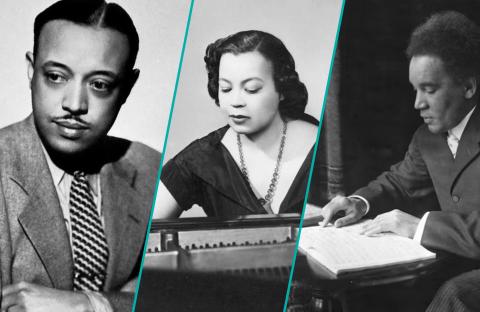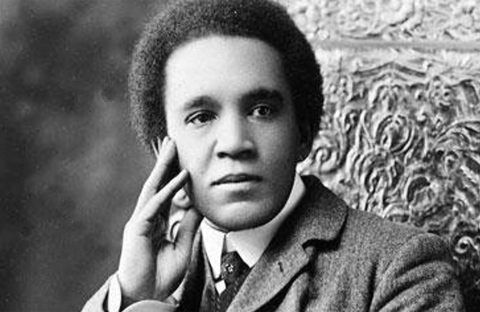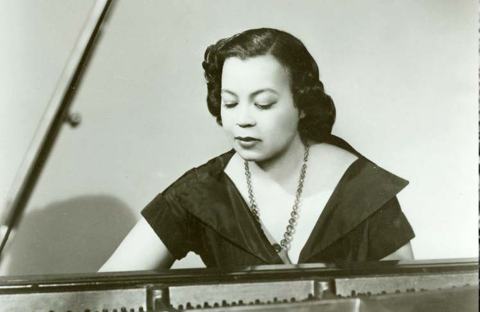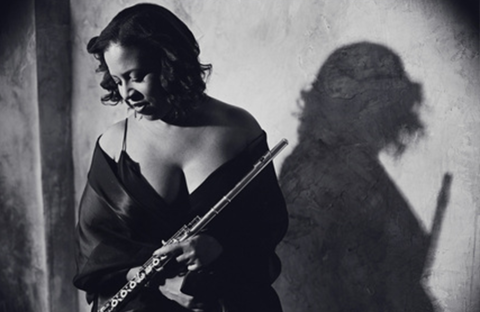Sounds of Black History at Symphony Hall

Boston Conservatory Orchestra’s Black History Month celebration will feature works by William Grant Still, Margaret Bonds, and Samuel Coleridge-Taylor.
What does history sound like? The answer, of course, depends on who writes it. When Boston Conservatory Orchestra celebrates Black History Month at Symphony Hall on February 16, listeners will hear how several Black composers responded to pivotal events of the past, from the Colonial era through the COVID-19 pandemic.
The English composer Samuel Coleridge-Taylor, for example, wrote an overture based on his fascination with Toussaint Louverture, a military hero from a century prior, who led former slaves to independence in Haiti. But in two other works from this upcoming concert, the composers documented current events of their day, much as journalists write the rough draft of history: Margaret Bonds’s Montgomery Variations made a grief-laden reply to the bombing of the 16th Street Baptist church in Birmingham, Alabama, which killed four Black girls in 1963. And for her piece, “Seven O’Clock Shout,” contemporary composer Valerie Coleman adapted the sounds of a daily ritual—New Yorkers cheering out their windows every night at 7:00 p.m. to support frontline workers during COVID-19 lockdowns.
Through its choice of repertoire, Boston Conservatory’s Black History Month concert also confronts a history of exclusion in Western classical music, the effects of which still linger today, with Black musicians comprising only 2.4 percent of orchestral players in the U.S., according to a 2023 study by the League of American Orchestras. The Conservatory’s performance will showcase lesser-known works by composers who broke through the color barrier in their lifetime—finding critical success, yet never fully entering the accepted canon.
“The whole history of concert music has been challenged by exclusivity,” says Emmett G. Price III, dean of the Africana Studies Division, which spans both Berklee College of Music and Boston Conservatory at Berklee. “If we’re courageous enough to engage that history, then we can see that it has been non-inclusive and non-equitable and, frankly, not just.”
The quality of the music makes its own case for inclusion year-round, Price says, not just in the month of February. “This concert—which happens to be in Black History Month—is really more so about expanding the palate for our students to be able to explore different forms of expression of good, quality music that is written by great composers.”
Bringing Long-Lost Parts to Life: Toussaint L’Ouverture

Samuel Coleridge-Taylor
It’s one thing to assert that Boston Conservatory Orchestra is committed to inclusive repertoire; but it’s quite another for the orchestra’s conductor to spend weeks recreating long-lost instrumental parts so that a forgotten piece can be performed for a live audience.
Professor Bruce Hangen was aware of Samuel Coleridge-Taylor’s 1901 composition, “Toussaint L’Ouverture,” an homage to the revolutionary general who fought to end slavery and lead Haiti to independence. But, he’d never actually heard the piece. When Hangen first went looking for recordings in the summer of 2023, none were known to exist. Curious to see if the overture would suit Boston Conservatory’s student orchestra, Hangen consulted a trusted repertoire guide, Daniels’ Orchestral Music, and came across the following note: “Novello, the ostensible publisher, is apparently unable to find the parts.”
Taking this as a sort of challenge, Hangen tracked down a photocopy of the score, written in Coleridge-Taylor’s own hand. Upon reading it, he was convinced the piece should be played, and set about transcribing each instrumental part using notation software—roughly 30 parts in total.
Unbeknownst to Hangen, his faculty counterpart at the Royal College of Music (RCM) in London had exactly the same idea—and beat Hangen to the punch by a matter of months. In April 2023 the RCM Philharmonic performed “Toussaint L’Ouverture,” paying special tribute to its alumnus Coleridge-Taylor (who attended RCM from 1890 to 1897). And in the fall of 2023, RCM world premiered a recording of the performance—several months after Hangen set out to find one. By that time, Hangen had already finished transcribing his own parts and was committed to performing the piece during Black History Month. “To bring it to life is a very important thing,” he says. “It’s a really excellent piece.”
Hangen has found no record of “Toussaint L’Ouverture” ever having been performed in the United States prior to 2024—which means that Boston Conservatory Orchestra’s February concert may be the piece’s U.S. debut. “I think it’s very likely that this is an American premiere,” he says. “But it all depends on how long the parts have been lost.”
Tracing the History of the Civil Rights Movement: The Montgomery Variations

Margaret Bonds
Coleridge-Taylor was himself a hero, particularly to Black musicians in the United States, where he toured three times in the early 1900s. His incontrovertible talent and groundbreaking success with white audiences were cause for hope—and inspired the naming of Black music schools in his honor. Composer and pianist Margaret Bonds studied at the Coleridge-Taylor Music School in Chicago, and her mother taught there for two decades.
As a composer and pianist active in 1930s Chicago, Bonds contributed to that city’s Black Renaissance movement (akin to the Harlem Renaissance). “She was a student of Florence Price and William Dawson, so she would’ve come through not only with a very pragmatic approach to composing and playing, but she had Black teachers,” says Price, “and so she would’ve been concerned with Black content and Black cultural contextualization.”
The Montgomery Variations was a later work by Bonds, and she heard it performed just once before her death in 1972. It was published for the first time in 2020 by the Hildegard Publishing Company in Worcester, Massachusetts—56 years after it was composed. Committed to preserving works by women composers, Hidegard has helped to facilitate a revival in the performance of Bonds’s music, publishing many of her compositions as part of its Margaret Bonds Signature Series.
Bonds composed the piece after the deadly bombing of the 16th Street Baptist Church in Birmingham by members of the KKK in 1963. Using the Black spiritual “I Want Jesus to Walk with Me” as her theme, she crafted seven variations that trace the history of the Civil Rights movement, starting with the Montgomery bus boycotts of 1955 and ending with Martin Luther King Jr.’s eulogy for the four Black girls who were murdered in their church.
Bonds dedicated the Variations to her own hero, Dr. King, whose lifelong commitment to racial justice sparked countless works by musicians, artists, and writers. Joseph Schwantner’s 1982 composition “New Morning for the World” also takes its inspiration from Dr. King, adapting text from his “I Have a Dream” speech as well as excerpts from written works, including Stride Toward Freedom and “Letter from Birmingham Jail.” Performances of the piece feature a narrator reciting Dr. King’s words, interspersed with Schwantner’s dramatic orchestration.
For its February 16 concert, Boston Conservatory Orchestra will welcome accomplished attorney and author Anita Hill as narrator. In addition to her professorship at Brandeis University, Hill has spent decades advocating for equality in the workplace. She serves as counsel to the law firm of Cohen, Milstein, Sellers and Toll, and has chaired the Human Rights Law Committee of the International Bar Association.
Making History of the Present: Seven O’Clock Shout

Valerie Coleman
In addition to the pieces by Bonds and Coleridge-Taylor, Boston Conservatory Orchestra’s performance on February 16 will contend with history so recent, it still feels like news. Valerie Coleman’s “Seven O’Clock Shout” recreates scenes from the earliest days of the COVID-19 pandemic, “the heartwarming ritual of evening serenades that brings people together amidst isolation, to celebrate life and the sacrifices of heroes.”
In her notes on the composition, Coleman goes on to explain how she was able to transform real life events into melody: “The work begins with a distant and solitary solo between two trumpets in fanfare fashion, to commemorate the isolation forced upon humankind, and the need to reach out to one another.”
Commissioned by the Philadelphia Orchestra and premiered virtually in July 2020, “Seven O'Clock Shout” is one of many recent works by Coleman (who, as a flutist, also founded the Grammy-nominated quintet Imani Winds). Over the past few decades, her compositions have been performed by major orchestras throughout the U.S., including the New York Philharmonic, Boston, Baltimore, Atlanta, and Toronto symphony orchestras.
Taking a comprehensive approach to concert programming—including works by contemporary composers like Coleman—is fundamental to the education of Boston Conservatory musicians, Price says.
“We should show the widest span of diverse expression of human condition, so that these students will be trained and will be seasoned in as wide a portfolio of repertoire as possible,” he says. “Should we continue to create an experience with a very narrow portfolio of repertoire, then we’re just exacerbating that which has been done for generations.”
Boston Conservatory Orchestra: Celebrating Black History Month—Featuring Anita Hill will take place on Friday, February 16 at 8:00 p.m. at Symphony Hall. This performance has been selected for Boston Conservatory's spring Center Stage collection. Tickets can be purchased online and Berklee students, faculty, and staff can claim up to two complimentary tickets in person at the Symphony Hall box office by presenting their Berklee ID.
